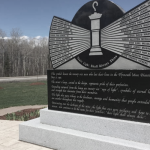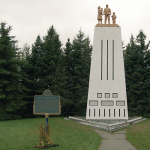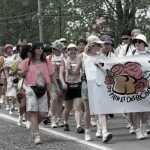By February 1912, IWW (Industrial Workers of the World) membership on the CN (Canadian Northern Railway) stood at 8,000. The government ignored the demand for adequate sanitation and an end to piece-rate or “gypo” wages. (The term “gypo” was a slang term for a logger working by the piece, or by the thousand board feet, for a wage or any other type of piece-rate work.)
On March 27, no longer able to tolerate the unbearable living conditions in the work camps, the 8,000 “dynos and dirthands” walked out. The strike extended over 400 miles of territory, but the IWW established a “1,000-mile picket line” as Wobs (short for “Wobblies” as members of the IWW began to be called that year) picketed employment offices in Vancouver, Seattle, Tacoma, San Francisco, and Minneapolis to halt recruitment of scabs.
Meanwhile, the strike camps were so well run and disciplined that the press began calling the Yale camp in particular a “miniature socialist republic.” While not going that far, the west coast IWW weekly, Industrial Worker, proudly pointed to this example of working class solidarity in which Canadians, Americans, Italians, Austrians, Swedes, Norwegians, French and other countrymen – one huge melting pot into which creed, colour, flag, religion, language and all other differences had been flung -were welded together in common effort. Even “demon rum” was proscribed, which alone indicates the seriousness of the strikers.
Authorities arrested the strikers by the thousands for “unlawful assemblage” and vagrancy. Many were forcibly deported, forcibly at gunpoint. But the picket lines held. In August they were joined by 3,000 construction workers on the Grand Trunk Pacific in BC and Alberta. The entire action, better known as the Fraser River Railway Strike, was popularized in song by Joe Hill‘s “Where the Fraser River Flows.” The strike also spawned the nickname Wobbly. A Chinese restaurant keeper who fed strikers reputedly mispronounced “IWW” in asking customers “Are you eye wobble wobble?” and the name stuck.
The CN strike lasted until the fall of 1912, when exhausted strikers settled for a few minor improvements: better sanitary conditions and a temporary end to the gypo system. The BC Grand Trunk strike was called off in January 1913 after the Dominion government promised to enforce sanitation laws. A greater gain was development of the “camp delegate” system in which the IWW secretary in town delegated a worker to represent him in the field – a method later refined into the permanent “Job Delegate” system of the roving Agricultural Workers.
Other unique features of the strike are worth mentioning. One, used again in the 20’s on the Northern Railway strike in Washington, was to “scab on the job” by sending convert Wobs into scab camps to bring the workers out on strike. Another came in response to the “free” transportation offered scabs by the Railways on condition a man’s luggage was impounded until such time as his strike breaking wages repaid the fare. Large Wob contingents signed on, leaving the Railways with cheap suitcases stuffed with bricks and gunnysacks, and then deserted en route.
Excerpt (edited for language and to include hyperlinks) from THE IWW IN CANADA, by G. Jewell 1975, IWW General Administration/Chicago
http://www.spunk.org/texts/groups/iww/sp000476.txt


